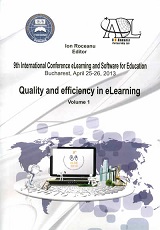THE IMPACT OF ICT ON THE VISUOMOTOR PRECISION OF STUDENTS WITH INTELLECTUAL DISABILITY
THE IMPACT OF ICT ON THE VISUOMOTOR PRECISION OF STUDENTS WITH INTELLECTUAL DISABILITY
Author(s): Ruxandra Foloştină, Elena SimionSubject(s): Education
Published by: Carol I National Defence University Publishing House
Keywords: attention; psychomotor; ICT; intellectual disability
Summary/Abstract: Problem Statement: The article aims to broach an issue less studied in Romania namely the effects of information and communication technology (ICT) in improving the learning process and in stimulating the cognitive development of the children with mild intellectual disability. Purpose of Study: The purpose of this study is to assess the impact of the ICT on the cognitive development of students with intellectual disability, especially on the visuomotor precision. Research Methods: In this research a group of 90 students with mild intellectual disability representing the experimental sample and a comparative group of 90 students with mild intellectual disability took part to an experiment including interactive media lessons. The members of both groups attend special schools. The participants are boys and girls in almost equal percentages and with the age ranging from 10 to 16 years and an IQ between 50 - 79. The NEPSY tests were used for a broader research, but only the results obtained to Visuomotor Test will be presented in this paper. Findings: After analyzing the results gathered we could see that there are some differences between the two groups concerning the visuomotor abilities. The results of the experimental group regarding the visuomotor abilities, after they used ICT in their learning process, are higher than the control sample, who did not used ICT in their learning. Conclusions: Data obtained in this research allowed us to conclude that integrating information and communication technology into teaching of children with special educational needs might help their rehabilitation and social inclusion.
Journal: Conference proceedings of »eLearning and Software for Education« (eLSE)
- Issue Year: 9/2013
- Issue No: 01
- Page Range: 327-332
- Page Count: 6
- Language: English

